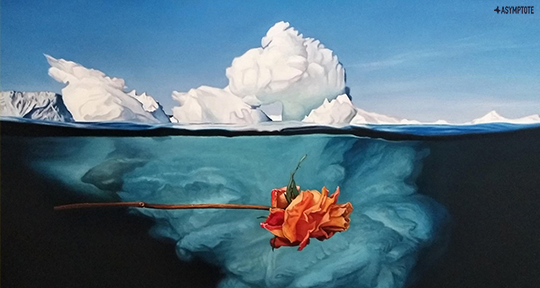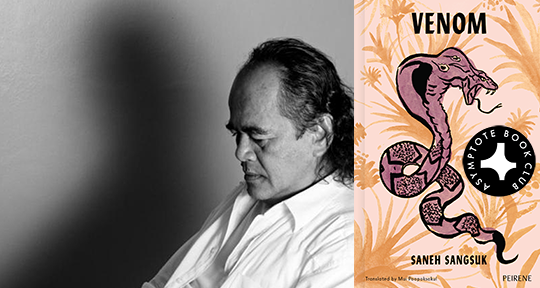Every month, the Asymptote Book Club shares a newly published, translated title with readers and subscribers. From Nobel laureates to electrifying debuts, this selection features some of the most powerful voices writing in any language, opening up an entry into the immense archives of wold literature. In this essay, we look back on the books of 2023 thus far.
Sign up for the Asymptote Book Club here and have our curated titles sent to your door!
Whenever a major event transpires, anywhere in the world, the instinct of many is to reach into the annals of writing—for explanation, ruminations, solace, transcriptions of history, glimmers of what’s to come, stories of people and their ordinary or extraordinary lives. . . On January 1 of this year, Croatia officially joined the Schengen Area, making it the twenty-seventh member to benefit from the region’s removal of border controls—and the search for Croatian books and literature went up 30%. During the surprising and intermittently absurd “Chinese balloon incident” in early February, searches for books on Chinese espionage went up a full 100%. Interest for Ukrainian literature stayed at a high amidst the ongoing conflict, and peaked when the International Criminal Court issued an arrest warrant against Vladimir Putin for committing war crimes regarding the illegal deportation of children. As a devastating civil war broke out in Sudan in mid-April, the world immediately sought out writing from and about the region, and when Niger’s government was overthrown in a military coup on July 26, searches for Nigerien books and authors also saw a significant surge. And as writers from Palestine and Israel continued, over the decades, to release texts around nation, land, exile, occupation, humanity, and violence both physical and psychological, we all watched in horror as the devastation grew almost unimaginably—and we looked for those books.
Books and the world they’re written in, books and the worlds they give us—sometimes reality would seem unbearable if literature were not there to decipher it, to give it heart. As the poet Adonis said, “My homeland is this spark this lightning in the darkness of the time remaining. . .” (translated by S.M. Toorawa); with language, such texts lend us that brightness, and we are rendered able to discover the many narratives and landscapes of our long, shadowy era.
In this year’s Book Club, we’ve thus far featured eleven titles: eleven authors, eleven countries, eleven languages, and eleven translators. Each brought their own entrancing energy of storytelling, whether taking history or the human psyche as material, building on myth or fearlessly experimental. There were titles that sought to give us a vivid portrait of a certain neighbourhood, a certain period. Others dove into the intricate channels of thinking to paint a picture of the mind. READ MORE…



A Pointed Atemporality: Mui Poopoksakul on Translating Saneh Sangsuk’s Venom
He's very aware of the rhythm and musicality of this text . . . he said it should take something like an hour and thirty-seven minutes to read.
In our May Book Club selection, a young boy struggles with a snake in the fictional village of Praeknamdang, in a tense battle between beauty and cruelty. In poetic language that is nostalgic for the world it describes without romanticizing it, Saneh Sangsuk creates a complex and captivating world. In this fable-like story there are no simple morals, in keeping with Sangsuk’s resistance to efforts to depict a sanitized view of Thailand and to the idea that the purpose of literature is to create a path to social change. In this interview with translator Mui Poopoksakul, we discuss the role of nature in the text, translating meticulous prose, and the politics of literary criticism.
The Asymptote Book Club aspires to bring the best in translated fiction every month to readers around the world. You can sign up to receive next month’s selection on our website for as little as USD20 per book; once you’re a member, join our Facebook group for exclusive book club discussions and receive invitations to our members-only Zoom interviews with the author or the translator of each title.
Barbara Halla (BH): How did you get into translation, especially given your law background?
Mui Poopoksakul (MP): I actually studied comparative literature as an undergrad, and then in my early twenties, like a lot of people who study the humanities, I felt a little bit like, “Oh, I need to get a ‘real job.’” I went to law school, and I worked at a law firm for about five years, and I liked that job just fine, but it just wasn’t what I wanted to do for the rest of my life.
So, I started thinking, What should I be doing? What do I want to do with myself? I had always wanted to do something in the literary field but didn’t quite have the courage, and I realized that not a lot of Thai literature been translated. I thought, If I can just get one book out, that would be really amazing. So, I went back to grad school. I did an MA in Cultural Translation at the American University of Paris, and The Sad Part Was was my thesis from that program. Because I had done it as my thesis, I felt like I was translating it for something. I wasn’t just producing a sample that might go nowhere.
The whole field was all new to me, so I didn’t know how anything worked. I didn’t even know how many pages a translation sample should be. But then I ended up not having to worry about that because I did the book as my thesis.
BH: You mentioned even just one book, but did you have any authors in mind? Was Saneh Sangsuk one of those authors in your ideal roster?
MP: I wouldn’t say I had a roster, but I did have one author in mind and that was Prabda Yoon, and that really helped me get started, because I wasn’t getting into the field thinking, “I want to translate.” My thought was, “I want to translate this book.” I think that helped me a lot, having a more concrete goal.
READ MORE…
Contributor:- Barbara Halla
; Languages: - English
, - Thai
; Place: - Thailand
; Writers: - Mui Poopoksakul
, - Prabda Yoon
, - Saneh Sangsuk
; Tags: - Deep Vellum
, - environmentalism
, - literary criticism
, - nature
, - nature in storytelling
, - pacing
, - pacing in translation
, - Peirene
, - respect for nature
, - rhythm
, - rhythm in translation
, - social commentary
, - storytelling
, - Thai literature